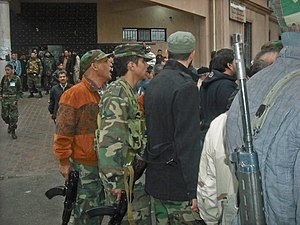Post-civil war violence in Libya
| Factional violence in Libya | ||||||||
|---|---|---|---|---|---|---|---|---|
| Part of the Libyan crisis (2011–present) (aftermath of the Libyan Civil War) | ||||||||
 Militiamen in the streets of Tripoli after skirmishes, January 2012. Since the end of the 2011 Libyan Civil War, armed militias had clashed throughout the country. |
||||||||
|
||||||||
| Belligerents | ||||||||
Government-sanctioned local militias
|
Various militias
|
|||||||
| Commanders and leaders | ||||||||
|
|
General Khalifa Haftar |
|
||||||
|
233 killed in 2014 |
||||||||
Indecisive; Start of the Libyan Civil War (2014)
Government-sanctioned local militias
Various militias
![]() Shura Council of Benghazi Revolutionaries
Shura Council of Benghazi Revolutionaries
Since the end of the 2011 Libyan Civil War, which overthrew Muammar Gaddafi, there has been violence involving various militias and the new state security forces. The violence has escalated into the current 2014 Libyan Civil War.
The militias include guerrillas, Islamists, and militias who fought against Gaddafi but refused to lay down their arms when the war ended in October 2011. According to some civilian leaders, these latter militias shifted from merely delaying the surrender of their weapons to actively asserting a continuing political role as "guardians of the revolution". Some of the largest, and most well-equipped militias are associated with Islamist groups now forming political parties. Before the official end of hostilities between loyalist and opposition forces, there were reports of sporadic clashes between rival militias, and vigilante revenge killings.
In September 2012, Islamists attacked the United States consulate building in Benghazi, killing the US ambassador and three others. This prompted a popular outcry against semi-legal militias that were still operating and resulted in the storming of several Islamist militia bases by protesters. A large-scale government crackdown followed on non-government sanctioned militias, with the Libyan Army raiding several now illegal militias' headquarters and ordering them to disband.
...
Wikipedia
